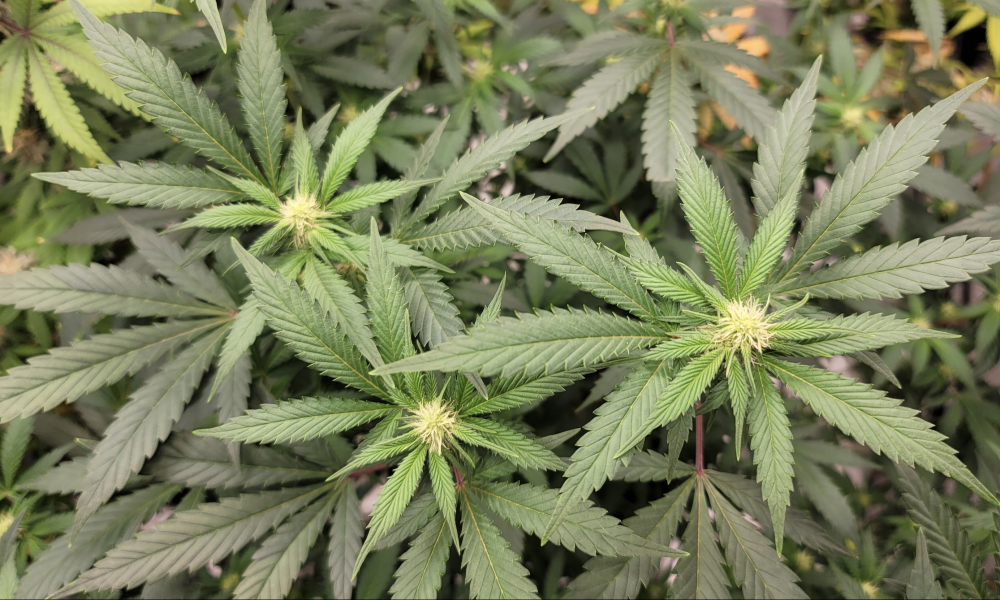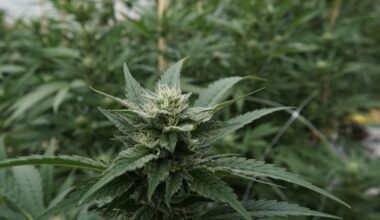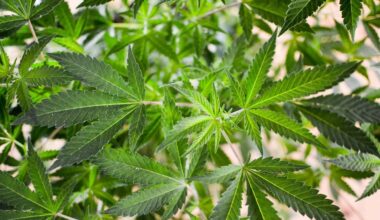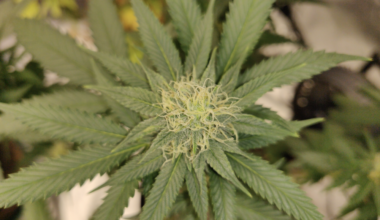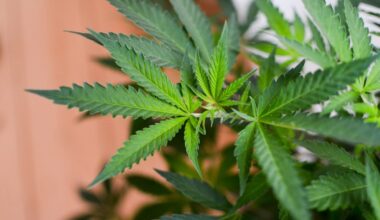The Democratic leader of a key U.S. Senate committee on Monday released the text of legislation that, if enacted, would finally allow Washington, D.C. to legalize recreational marijuana sales—in contravention of the wishes of President Joe Biden.
The new bills and attached report language announced by Senate Appropriations Committee Chairman Patrick Leahy (D-VT), which are part of a package of legislation to fund the federal government for Fiscal Year 2022, also contain several additional cannabis-related provisions. Among others, they would continue an existing protection for state medical marijuana laws, call on the federal government to reconsider policies that fire employees for cannabis, criticize the restrictive drug classification system that impedes scientific research and encourage the development of technologies to detect THC-impaired driving.
The House included its own cannabis-related legislative provisions and report language on many of these issues in large-scale appropriations legislation it passed in July. Since then, the 2022 fiscal year technically started on October 1 but the government has been operating on a temporary “continuing resolution” for spending while the Senate has worked to catch up on its bills.
The current temporary funding is set to expire on December 3, however, and Democratic leaders want to finalize FY22 appropriations by then.
Here’s a look at the full language of the cannabis-related provisions in new spending bills and attached reports:
Letting Washington, D.C. Legalize
Perhaps the most consequential aspect of the new bills is what’s missing: A longstanding rider that has prevented Washington, D.C. from spending its own money to legalize and regulate adult-use marijuana sales. While local voters approved a ballot initiative to allow low-level cannabis possession and home cultivation in 2014, Congress has since blocked local officials from adding a legal sales component.
The new legislation from the Appropriations Committee omits the rider, which Biden proposed to continue with the budget request he sent to Congress in May. The House appropriations legislation approved this summer does not include the provision, and the fact that it’s not in the Senate bill either greatly increases the chances that the District of Columbia—where officials have scheduled a hearing on a legalization bill for next month—will be able to allow cannabis commerce by the end of this year if Congress completes the appropriations process.
Protecting State Medical Cannabis Laws
The bill that covers the Department of Justice (DOJ) contains a rider, versions of which have been enacted into law since 2014, that prevents DOJ from interfering with the implementation of state medical cannabis laws:
“SEC. 531. None of the funds made available under this Act to the Department of Justice may be used, with respect to any of the States of Alabama, Alaska, Arizona, Arkansas, California, Colorado, Connecticut, Delaware, Florida, Georgia, Hawaii, Illinois, Indiana, Iowa, Kentucky, Louisiana, Maine, Maryland, Massachusetts, Michigan, Minnesota, Mississippi, Missouri, Montana, Nevada, New Hampshire, New Jersey, New Mexico, New York, North Carolina, North Dakota, Ohio, Oklahoma, Oregon, Pennsylvania, Rhode Island, South Carolina, South Dakota, Tennessee, Texas, Utah, Vermont, Virginia, Washington, West Virginia, Wisconsin, and Wyoming, or with respect to the District of Columbia, the Commonwealth of the Northern Mariana Islands, the United States Virgin Islands, Guam, or Puerto Rico, to prevent any of them from implementing their own laws that authorize the use, distribution, possession, or cultivation of medical marijuana.”
The House on several occasions has passed amendments that would expand the protection to cover recreational marijuana laws as well, but the Senate has not yet followed suit. It remains to be seen if any senators will move to add the adult-use protection in committee or on the floor this year.
Marijuana Issues For Federal Employees
The report for the bill on Financial Services and General Government encourages a review of employment policies for federal agencies with respect to personal use of cannabis:
“Federal Employment Guidelines.—The Committee supports the updated guidance on agencies’ consideration of how an individual’s marijuana use may or may not adversely affect the integrity or efficiency of the government and impact an individual’s suitability or fitness for a position. The Committee encourages OPM and the Suitability Executive Agent to continue to review these policies and guidelines regarding hiring and firing of individuals who use marijuana in states where that individual’s private use of marijuana is not prohibited under the law of the State. These policies should reflect updated changes to the law on marijuana usage and clearly state the impact of marijuana usage on Federal employment.”
Hemp Issues
In the report for the Justice Department bill, the panel is urging the Drug Enforcement Administration (DEA) to make available field testing technology that can help law enforcement distinguish between legal hemp and still-illegal marijuana:
“Hemp Testing Technology.—The Agriculture Improvement Act of 2018 (Public Law 115–334) removed hemp and its derivatives from the Controlled Substances Act (Public Law 91–513, as amended), and authorized the production, consumption, and sale of hemp and hemp-derived products in the United States. The Act requires random testing to ensure hemp meets the definition under the law of having a delta-9 tetrahydrocannabinol [THC] concentration of less than 0.3 percent. The Committee is aware that DEA has developed field testing kits that can distinguish between hemp and marijuana on-the-spot. The Committee directs the DEA to continue to work to ensure State and local law enforcement have access to this field test technology so they can more efficiently conduct their drug interdiction efforts at the local level. The Committee further directs the DEA to report back to the Committee not later than 180 days after enactment of this act, and not less than every 6 months thereafter, until such time as testing kits are deployed to State and local law enforcement in the field.”
A provision that has been included in past appropriations legislation that prohibits the use of funds to interfere in the implementation of state hemp programs is also being extended:
“SEC. 530. None of the funds made available by this Act may be used in contravention of section 7606 (“Legitimacy of Industrial Hemp Research”) of the Agricultural Act of 2014 (Public Law 113–79) by the Department of Justice or the Drug Enforcement Administration.”
Marijuana Research
The panel included a provision in the report attached to the bill to fund the Department of Health and Human Services (HHS) that criticizes federal barriers to studying marijuana and other Schedule I drugs:
“Barriers to Research.—The Committee is concerned that restrictions associated with Schedule I of the Controlled Substance Act which effectively limits the amount and type of research that can be conducted on certain Schedule I drugs, especially opioids, marijuana or its component chemicals and new synthetic drugs and analogs. At a time when we need as much information as possible about these drugs and antidotes for their harmful effects, the Committee believes we should be lowering regulatory and other barriers to conducting this research. The Committee appreciates NIDA’s completion of a report on the barriers to research that result from the classification of drugs and compounds as Schedule I substances including the challenges researchers face as a result of limited access to sources of marijuana including dispensary products.”
The committee report also expresses concerns that cannabis policy changes are moving faster than science on marijuana and its components:
“Marijuana Research.—The Committee is concerned that marijuana policies on the Federal level and in the states (medical marijuana, recreational use, etc.) are being changed without the benefit of scientific research to help guide those decisions. NIDA is encouraged to continue supporting a full range of research on the health effects of marijuana and its components, including research to understand how marijuana policies affect public health and the impacts associated with high potency cannabis. There is insufficient scientific information about the short-term and long-term effects of compounds found in cannabis, including cannabidiol [CBD] and cannabigerol [CBG], cannabichromene [CBC], minor cannabinoids, and terpenes. Additional, coordinated, research on a national scale is necessary to determine the toxicology and medicinal effects of CBD, CBG CBC, minor cannabinoids, and terpenes. The Committee believes that NIH should strongly consider significantly expanding the use of funds to study the medicinal effects and toxicology of CBD, CBG, CBC, minor cannabinoids, and terpenes. This expanded effort should include funding of clinical trials with academic health centers to study the long-term medicinal benefits and toxicology of CBD and CBG.”
Appropriators are also worried about the potency of marijuana, and they want federal agencies to study the effects of high-THC products:
“THC Potency.—Given the increasing number of individuals using high potency cannabis in the United States and the potential adverse public health effects associated with its use, the Committee encourages NIH to support research on the short- and long-term impacts associated with high potency cannabis that could inform the establishment of THC limits in commercially-available marijuana products.”
Impaired Driving
The report on the bill to fund the Department of Transportation calls on the National Highway Traffic Safety Administration (NHTSA) to develop a standardized field sobriety test to detect marijuana impairment:
“The Committee is also aware of NHTSA’s efforts to examine the feasibility of a standardized field test for marijuana impairment. NHTSA previously completed a project to gather, evaluate, and interpret recent literature on tests of impairment from marijuana or other drugs. A number of different tests were reviewed, including tests of cognitive ability, behavioral tests, tests of physical capability, physiological tests, and driving skills tests. The Committee encourages NHTSA to use the results of the laboratory tests to move forward to field testing and to work towards the development of a standardized field sobriety test to detect levels of marijuana impairment. NHTSA’s work should focus on all commonly available cannabis products. NHTSA should also consider issuing toxicology testing guidance to State officials in accordance with recommendations issued by the National Safety Council in the publication entitled, “Recommendations for Toxicological Investigation of Drug-Impaired Driving and Motor Vehicle Fatalities-2021 Update” and consult with relevant accredited universities.”
Blocking Legalization Advocacy
The report on the HHS bill also contains a 1990s-era provision banning the use of federal funds to advocate for the legalization of Schedule I drugs:
“SEC. 507. (a) None of the funds made available in this Act may be used for any activity that promotes the legalization of any drug or other substance included in schedule I of the schedules of controlled substances established under section 202 of the Controlled Substances Act except for normal and recognized executive-congressional communications.
“(b) The limitation in subsection (a) shall not apply when there is significant medical evidence of a therapeutic advantage to the use of such drug or other substance or that federally sponsored clinical trials are being conducted to determine therapeutic advantage.”
In the House, Rep. Alexandria Ocasio-Cortez (D-NY) filed a floor amendment to delete this provision, arguing that it discourages research into Schedule I drugs, including psychedelics like psilocybin and MDMA. But lawmakers defeated her proposal.
Other Issues
The Senate Appropriations Committee already cleared several other spending bills in August, including one that covers the U.S. Department of Agriculture and Food and Drug Administration. The report attached to that legislation contains several directives to federal agencies on hemp and CBD regulations.
Another bill approved in August to fund the U.S. Department of Veterans Affairs (VA) includes an amendment to allow VA doctors to issue medical cannabis recommendations in legal states.
It’s not yet clear when the spending panel or full Senate will take up the new bills that Leahy released on Monday.
Bank Of America Cancels Account Of Marijuana And Psychedelics Research Institute Registered With DEA
Medical Disclaimer:
The information provided in these blog posts is intended for general informational and educational purposes only. It is not a substitute for professional medical advice, diagnosis, or treatment. Always seek the advice of your physician or other qualified healthcare provider with any questions you may have regarding a medical condition. The use of any information provided in these blog posts is solely at your own risk. The authors and the website do not recommend or endorse any specific products, treatments, or procedures mentioned. Reliance on any information in these blog posts is solely at your own discretion.
